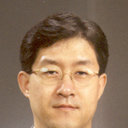The effects of high glucose concentration on angiotensin II- or transforming growth factor-beta-induced DNA synthesis, hypertrophy and collagen synthesis in cultured rat mesangial cells.
Schlüsselwörter
Abstrakt
Hyperglycemia is a principal characteristic of diabetes, and has an influence on many cellular functions. In order to investigate whether the intracellular signaling pathways inducing proliferation, hypertrophy and matrix synthesis of mesangial cells are altered in a diabetic environment, we evaluated the effects of a high concentration of extracellular glucose(25 mM; 450 mg/dl) on [3H]thymidine uptake, hypertrophy, and [3H]proline incorporation into a collagenase-sensitive protein, induced by angiotensin II(Ang II) or transforming growth factor(TGF)-beta, in cultured rat mesangial cells. The exposure to a high glucose concentration for 7 days significantly inhibited Ang II(10(-6) M)-induced [3H]thymidine uptake, compared to normal glucose concentration (5 mM)(M +/- SD., 1050 +/- 100 cpm/well vs 550 +/- 97, p < 0.05), and markedly prevented the inhibition of [3H]thymidine uptake by TGF-beta(1 ng/ml)(132 +/- 10 vs 340 +/- 67, p < 0.05). The administration of H-7(50 microM), a protein kinase C(PKC) inhibitor, did not reverse these effects of high glucose on [3H]thymidine uptake. On flow cytometric analysis of cell size, the mean cell size was significantly greater for the cells exposed to high glucose or treated with Ang II or TGF-beta, compared to that for the untreated cells. But the addition of Ang II or TGF-beta to the cells exposed to high glucose did not show further enlargement in size. The exposure to high glucose and the treatment with Ang II or TGF-beta significantly increased collagen synthesis, measured by [3H]proline incorporation. The Ang II -or TGF-beta-induced increase of [3H]proline incorporation did not show changes under high glucose culture condition, compared to normal glucose concentration(Ang II, 27880 +/- 3560 cpm vs 26978 +/- 2284, TGF-beta, 26559 +/- 3700 vs 25800 +/- 1660, p > 0.05). In conclusion, although the signaling pathway for DNA synthesis by Ang II or TGF-beta are influenced, possibly mediated by PKC-independent mechanism(s), the pathway inducing hypertrophy or collagen synthesis by both agents appears to be unchanged under the high extracellular glucose concentration in cultured rat mesangial cells.


